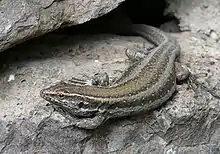Boettger's lizard
Boettger's lizard (Gallotia caesaris) is a species of wall lizard in the family Lacertidae. The species is endemic to the Canary Islands. There are two recognized subspecies.
| Boettger's lizard | |
|---|---|
 | |
| Young female of Gallotia caesaris gomerae | |
| Scientific classification | |
| Domain: | Eukaryota |
| Kingdom: | Animalia |
| Phylum: | Chordata |
| Class: | Reptilia |
| Order: | Squamata |
| Family: | Lacertidae |
| Genus: | Gallotia |
| Species: | G. caesaris |
| Binomial name | |
| Gallotia caesaris (Lehrs, 1914) | |
| Synonyms[2] | |
| |
Etymology
The specific name, caesaris, is in honor of German malacologist Caesar Rudolf Boettger, who was a nephew of German herpetologist Oskar Boettger.[3]
Geographic range
G. caesaris is native to two of the western Canary Islands, El Hierro and La Gomera.[2] On the neighboring islands Tenerife and La Palma it is replaced by its close relative Gallotia galloti.[4] G. caesaris has been introduced by humans on the Portuguese island of Madeira.[5]
Habitat
The preferred natural habitats of G. caesaris are rocky areas, shrubland, and forest, at altitudes from sea level to 1,500 m (4,900 ft).[5]
Reproduction
G. caesaris is oviparous.[2] A sexually mature female may lay three clutches per year, and each clutch may contain 1–5 eggs.[5]
Subspecies
Two subspecies are recognized as being valid, including the nominotypical subspecies:[2]
- Gallotia caesaris caesaris (Lehrs, 1914) – El Hierro
- Gallotia caesaris gomerae (C. Boettger & L. Müller, 1914) – La Gomera
Nota bene: A trinomial authority in parentheses indicates that the subspecies was originally described in a genus other than Gallotia.
References
- Jose Antonio Mateo Miras, Valentin Pérez-Mellado, Paulo Sá-Sousa, Iñigo Martínez-Solano (2009). "Gallotia caesaris". IUCN Red List of Threatened Species. 2009: e.T61503A12493473. doi:10.2305/IUCN.UK.2009.RLTS.T61503A12493473.en. Retrieved 12 November 2021.
{{cite journal}}: CS1 maint: multiple names: authors list (link) - Species Gallotia caesaris at The Reptile Database www.reptile-database.org.
- Beolens B, Watkins M, Grayson M (2011). The Eponym Dictionary of Reptiles. Baltimore: Johns Hopkins University Press. xiii + 296 pp. ISBN 978-1-4214-0135-5. (Gallotia caesaris, p. 29).
- Maca-Meyer et al. (2003).
- Miras et al. (2009).
Further reading
- Bannert B (1998). "Zum Fortpflanzungsbiologie der Halsbandeidechsen von Madeira und den Kanarischen Inseln in Gefangenschaft ". Salamandra 34 (4): 289–300. (Gallotia caesaris, restored to species status). (in German, with an abstract in English).
- Boettger CR, Müller L (1914). "Preliminary Notes on the Local Races of some Canarian Lizards". Annals and Magazine of Natural History, Eighth Series 14: 67–78. ("Lacerta galloti cæsaris ", new status, p. 74).
- Lehrs P (1914). "Description of a new lizard from the Canary Islands". Proceedings of the Zoological Society of London 1914: 681–684. ("Lacerta cæsaris ", new species).
- Sindaco R, Jeremčenko VK (2008). The Reptiles of the Western Palearctic. 1. Annotated Checklist and Distributional Atlas of the Turtles, Crocodiles, Amphisbaenians and Lizards of Europe, North Africa, Middle East and Central Asia. (Monographs of the Societas Herpetologica Italica). Latina, Italy: Edizioni Belvedere. 580 pp. ISBN 978-88-89504-14-7.
External links
- de.Wikipedia contributors (2006): Kleine Kanareneidechse. Wikipedia, Die freie Enzyklopädie. Version of 12:35, 17. Feb. 2006. Retrieved 18:53, May 18, 2006.
- Maca-Meyer N, Carranza S, Rando JC, Arnold EN, Cabrera VM (2003). "Status and relationships of the extinct giant Canary Island lizard Gallotia goliath (Reptilia: Lacertidae), assessed using ancient mtDNA from its mummified remains". Biological Journal of the Linnean Society 80 (4): 659–670. doi:10.1111/j.1095-8312.2003.00265.x (HTML abstract).
- Jose Antonio Mateo Miras, Valentin Pérez-Mellado, Paulo Sá-Sousa, Iñigo Martínez-Solano (2009). "Gallotia caesaris". IUCN Red List of Threatened Species. 2009: e.T61503A12493473. doi:10.2305/IUCN.UK.2009.RLTS.T61503A12493473.en. Retrieved 12 November 2021.
{{cite journal}}: CS1 maint: multiple names: authors list (link) Database entry includes a range map and a brief justification of why this species is of least concern.
- lacerta.de: Gallotia caesaris caesaris image gallery. Retrieved 2007-FEB-25.
- lacerta.de: Gallotia caesaris gomerae image gallery. Retrieved 2007-FEB-25.
